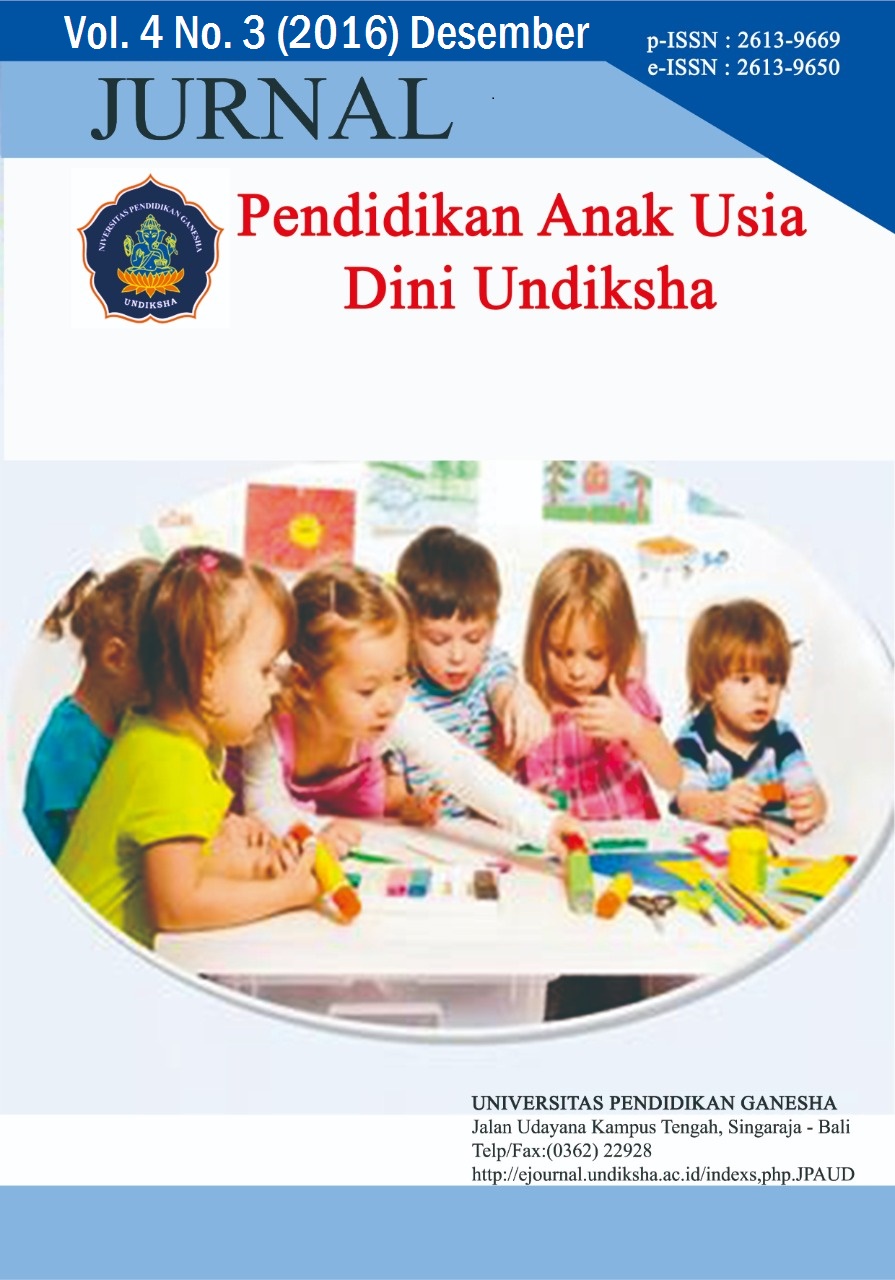Penerapan Metode Bermain Peran Untuk Meningkatkan Kemampuan Sosial Anak Usia 4-5 Tahun Semester I di Tk Trisula Singaraja Tahun Pelajaran 2016/2017
DOI:
https://doi.org/10.23887/paud.v4i3.8821Abstract
Penelitian ini bertujuan untuk meningkatkan kemampuan sosial anak melalui kegiatan bermain peran pada anak usia 4-5 tahun di TK Trisula Singaraja. Jenis penelitian ini merupakan Penelitian Tindakan Kelas, yang dilaksanakan dalam dua siklus. Subyek penelitian ini adalah anak usia 4-5 tahun di kelompok A TK Trisula Singaraja dengan jumlah anak didik sebanyak 15 orang anak. Pengumpulan data menggunakan metode observasi. Teknik analisis data yang digunakan dalam penelitian ini adalah statistik deskriptif dan metode analisis deskriptif kuantitatif. Hasil analisis data menunjukkan bahwa terjadi peningkatan kemampuan sosial anak dari penerapan metode bermain peran mencapai 22,3%. Data ini didapat dari perbandingan antara data siklus I dan data siklus II, dimana nilai rata-rata skor persentase pada siklus I sebesar 61,35% dan terjadi peningkatan pada siklus II yaitu 83,65% Jadi dari kedua tindakan tersebut keterampilan sosial anak dapat meningkat. Hal ini dapat dibuktikan dengan hasil penelitian dari kondisi awal sampai siklus II kemampuan sosial anak mengalami peningkatan setelah penerapan metode bermain peran. Maka dapat disimpulkan bahwa penerapan metode bermain peran dapat meningkatkan kemampuan sosial emosional anak usia 4-5 tahun semester I di Tk Trisula Singaraja.Kata Kunci : bermain, peran, sosial
This study aims to improve the social skills of children through role play activities in children aged 4-5 years in kindergarten of Trisula Singaraja. This type of research is a classroom action research, which was conducted in two cycles. The subjects of this study is children aged 4-5 years in group A kindergarten of Trisula Singaraja by the number of students as many as 15 children. Collecting data using the method of observation. Data analysis techniques used in this research is descriptive statistics and quantitative descriptive analysis method. The result showed that an increase in social skills of children from the application of methods play a role reached 22.3%. This data was obtained from a comparison between the data first cycle and the second cycle of data, where the value of the average percentage score in the first cycle of 61.35% and an increase in the second cycle is 83.65% So from both actions can increase a child's social skills , This can be evidenced by the results of the first condition to the second cycle of children's social skills has increased after the application of methods play a role. It can be concluded that the application of the method of playing the role can improve social skills of children aged 4-5 years emotional first semester at kindergarten of Trisula Singaraja.
keyword : playing, role, social
Published
2016-11-08
How to Cite
., D. D. I. R. I., ., P. D. N. K. S., & ., P. A. A. S. (2016). Penerapan Metode Bermain Peran Untuk Meningkatkan Kemampuan Sosial Anak Usia 4-5 Tahun Semester I di Tk Trisula Singaraja Tahun Pelajaran 2016/2017. Jurnal Pendidikan Anak Usia Dini Undiksha, 4(3). https://doi.org/10.23887/paud.v4i3.8821
Issue
Section
Articles
License
Authors who publish with the Jurnal Pendidikan Anak Usia Dini Undiksha agree to the following terms:
- Authors retain copyright and grant the journal the right of first publication with the work simultaneously licensed under a Creative Commons Attribution License (CC BY-SA 4.0) that allows others to share the work with an acknowledgment of the work's authorship and initial publication in this journal.
- Authors are able to enter into separate, additional contractual arrangements for the non-exclusive distribution of the journal's published version of the work (e.g., post it to an institutional repository or publish it in a book), with an acknowledgment of its initial publication in this journal.
- Authors are permitted and encouraged to post their work online (e.g., in institutional repositories or on their website) prior to and during the submission process, as it can lead to productive exchanges, as well as earlier and greater citation of published work. (See The Effect of Open Access)











